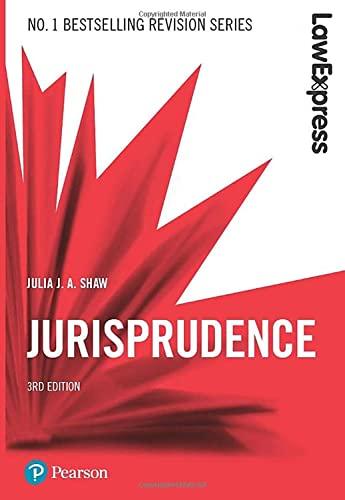Question
A is a father. B is a son. A and B enter into a contract, where the father promises that upon completion of 4 years
A is a father. B is a son. A and B enter into a contract, where the father promises that upon completion of 4 years of college and a college degree, A will provide $70,000 for a new car at graduation. The father plans on buying a new Cadillac from XZY Cadillac Co. So the father officially proclaims to the son, if you get your 4- year degree, I will buy you a new Cadillac from XYZ Cadillac Company. XYZ Cadillac Company is an incidental 3rd party beneficiary to this contract. They benefit from the agreement between A and B, but have no right to sue to enforce. For example, let's say that somehow XYZ got word of this plan and thought to themselves, "when that boy graduates, we're going to get a nice new sale." Later, a couple of months or weeks before graduation, what if the son says to his father, "you know, I am about to get my degree, but I think I'd rather get a $70,000 BMW as opposed to a $70,000 Cadillac." The father says, "Fine." So they decide instead that they will go to ABC BMW instead of XYZ Cadillac. Could XYZ Cadillac sue as a third party beneficiary? [Answer] No. This is because XYZ Cadillac is an incidental beneficiary as opposed to an intended beneficiary. XYZ was set to benefit only incidentally from the agreement. And an incidental beneficiary acquires no rights under the contract. 2. Intended Beneficiaries Intended beneficiaries are 3rd parties who acquire rights under the contract. They can sue to enforce those rights. There are 3 types of Intended beneficiaries. 1. Donee Beneficiaries; ("donee" is synonymous with the term gift.) You are giving a benefit to a third party for the express purposes of giving a "gift." Donee Beneficiary Example: A owes B $1,000 on a contract (A is the obligor). B is the father of C. B orders A to pay C the $1,000 instead of B. C, the son is a donee beneficiary. C can sue A if A fails to pay, but cannot sue B if B changes his mind and substitutes D as new beneficiary (can't change beneficiaries once C's rights have vested). 2. Insurance Beneficiaries; typically we are talking about life insurance contracts. [Insurance beneficiary diagram] A is the insurance company. B is the insured. C is the insurance beneficiary. B pays premiums to A, and in return, A insures B's life. C is the insurance beneficiary. The deal is that at B's death, A pays according to the policy terms. Or A will pay C. C, the insurance beneficiary can sue A, for non-payment at B's death if A unjustifiably refuses to do so. But, C cannot sue B if B changes beneficiaries to D (unless there is a contract not to change beneficiaries- for example pursuant to a divorce agreement). A. Insurance Company B. Insured Insures Life Pays Premiums In the event of B's death, A must pay C C. Insurance beneficiary 3. Creditor Beneficiaries- is an outside 3rd party to whom one or both of the contracting parties owe a continuing debt of obligation arising from a contract. Once named, a creditor beneficiary has the highest range of rights of all third party beneficiaries. Creditor Beneficiary Example: A is an obligor and owed B $1,000. B owes C $1,000. B orders A to pay C instead of himself, which, when done, cancels the debt B owes C. C is a creditor beneficiary. If A does not pay, C can sue either A or B to get his $1,000. Also, once B makes he order to A, he can' t change his mind.
draw out the diagram for donee beneficiaries and creditor beneficiaries using my examples. If some people want to diagram these on Word and post these diagrams, thats fine. For the purposes of this practice, also include the father/ son, XYZ Cadillac example.
Step by Step Solution
There are 3 Steps involved in it
Step: 1

Get Instant Access to Expert-Tailored Solutions
See step-by-step solutions with expert insights and AI powered tools for academic success
Step: 2

Step: 3

Ace Your Homework with AI
Get the answers you need in no time with our AI-driven, step-by-step assistance
Get Started


